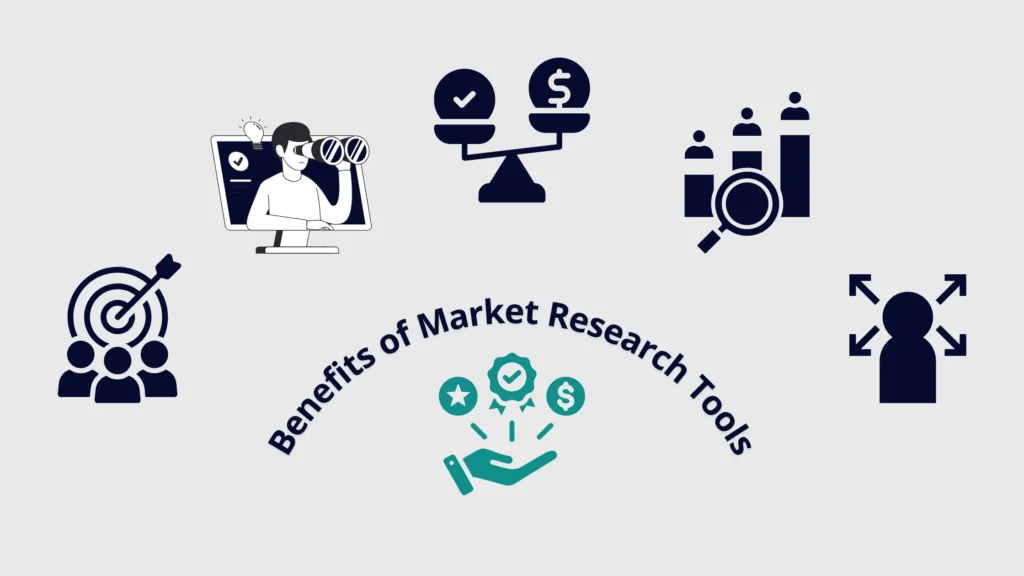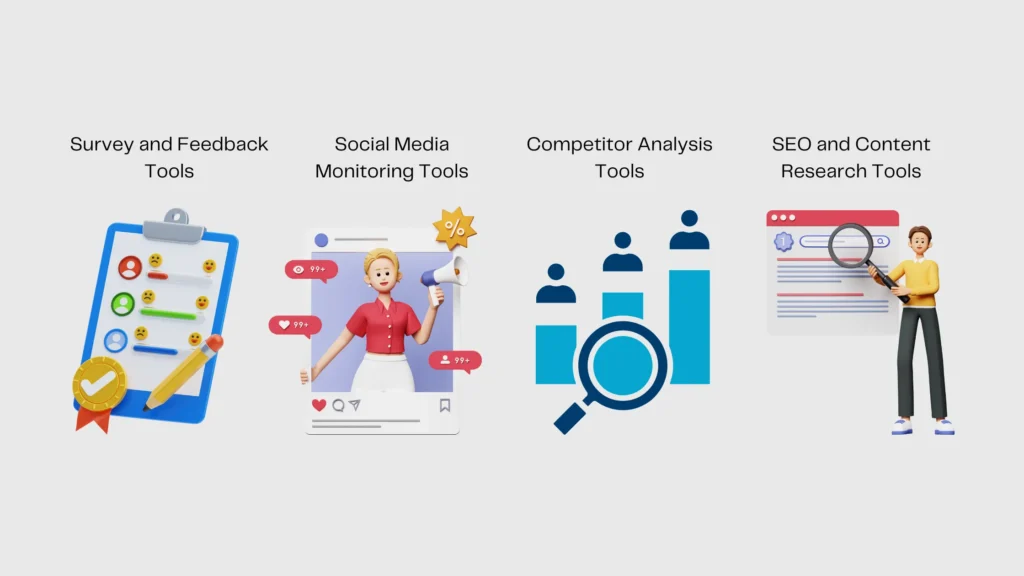Table of Contents
ToggleMarket research tools help businesses understand customer needs, track market trends, and make informed decisions. Whether you’re a small business owner or part of a large corporation, these tools can provide valuable consumer insights to guide your marketing strategies.
This guide explores the most effective market research tools available today, their features, and how market research tools can benefit your organization.
Quick List of Top Market Research Tools
| Tool Name | Best For | Key Features | Price Range |
|---|---|---|---|
| SurveyMonkey | Creating surveys | Easy question types, audience targeting | Free – $99/month |
| BuzzSumo | Content research | Content discovery, influencer outreach | Free – $299/month |
| Google Trends | Trend analysis | Real-time search data, regional interest | Free |
| Statista | Industry statistics | Data visualization, market reports | Free – $59/month |
| Answer the Public | Keyword research | Question-based search insights | Free – $99/month |
| Similarweb | Competitor analysis | Traffic insights, audience analysis | Free – Custom |
| Meltwater | Social media monitoring | Brand mentions, sentiment analysis | Custom pricing |
| GWI | Consumer insights | Global audience data, behavioral trends | Custom pricing |
| Ubersuggest | SEO research | Keyword suggestions, competitor data | Free – $29/month |
| Typeform | Interactive surveys | User experience focused surveys | Free – $59/month |
What Are Market Research Tools?
Market research tools are software platforms and resources that help businesses collect, analyze, and interpret data about their target audience, competitors, and industry.
These tools transform complex processes into streamlined workflows, enabling companies to make better business decisions based on actual data rather than guesswork.
Unlike traditional research methods, which can be time-consuming and expensive, modern market research tools offer quick access to valuable information, often in real-time. These tools range from survey platforms and social media listening tools to data analytics software and competitor intelligence resources.
Benefits of Market Research Tools

Using the right research tools can transform how businesses approach their markets for several important reasons:
1. Understanding Your Target Audience
Market research tools help you gather demographic information about your potential customers, including age, location, income, and interests.
This knowledge lets you create products or services that better meet customer needs.
2. Identifying Market Opportunities
Research tools can analyze market trends and consumer behavior to highlight gaps in the market that your business might fill.
This insight is particularly valuable for startups and small business owners looking to find their niche.
3. Tracking Competitors
Most research platforms include features for monitoring competitor activities, including their marketing strategies, product offerings, and market share.
This competitive intelligence helps you position your business more effectively.
4. Making Data-Driven Decisions
Instead of relying on intuition, market research tools provide data to support strategic decisions about product development, pricing, and marketing campaigns. This approach significantly reduces business risk.
5. Measuring Marketing Effectiveness
These tools help track how well your marketing efforts perform, allowing you to adjust strategies for better results.
By understanding which channels work best, you can optimize your marketing budget.
Types of Market Research Tools

Market research tools can be categorized based on their primary functions:
Survey and Feedback Tools
Survey tools help businesses collect direct feedback from customers through various question types. Popular options include:
- SurveyMonkey: Creates in-depth surveys with various question formats and analytics capabilities.
- Typeform: Offers interactive, user-friendly surveys that improve response rates.
- SurveySparrow: Provides conversational surveys that engage respondents.
Social Media Monitoring Tools
These tools track brand mentions and analyze consumer sentiment across social platforms:
- Meltwater Radarly: Delivers real-time insights into consumer preferences based on online conversations.
- Brandwatch: Monitors social media for brand mentions and sentiment analysis.
- Awario: Tracks mentions of people, companies, and products across the web.
Competitor Analysis Tools
These platforms help you research competitors and understand their strategies:
- Similarweb: Provides traffic information and competitive intelligence about websites.
- SpyFu: Shows what kind of paid ads your competitors are investing in.
- Crayon: Tracks changes to competitor websites and marketing materials.
SEO and Content Research Tools
These help identify valuable keywords and content opportunities:
- Answer the Public: Shows specific questions people are asking on search engines about your keywords.
- BuzzSumo: Highlights trending topics and popular content in your niche.
- Ubersuggest: Provides keyword suggestions and difficulty ratings.
Market Intelligence Platforms
These comprehensive tools offer wide-ranging market data:
- Statista: Aggregates data into graphics and publishes reports on numerous industries.
- GWI: Offers access to data on consumer views and behaviors across multiple countries.
- Google Trends: Shows how search terms are trending over time and by region.
Guesswork won’t grow your business—data will. The right research methods help you uncover hidden opportunities, outsmart competitors, and make confident decisions.
Top Market Research Tools (with Key Features)
1. SurveyMonkey
SurveyMonkey is one of the most powerful tools for creating market research surveys. With over 100 templates and multiple question types, it helps businesses understand market and consumer preferences.
Key features:
- Customizable survey templates
- Logic branching for personalized question paths
- Real-time results dashboard
- Integration with other business tools
SurveyMonkey is particularly valuable for collecting direct feedback from current customers or testing ideas with potential ones.
2. Google Trends
Google Trends provides free insights into search patterns and trending topics based on search engine data. It’s an excellent tool for understanding changing consumer interests over time.
Key features:
- Real-time search trend data
- Regional interest comparisons
- Related topics and queries
- Historical trend analysis
Businesses use Google Trends to identify seasonal patterns, emerging topics, and regional differences in consumer interests.
3. Answer the Public
This visually-driven research tool shows what questions people are asking on search engines about specific topics. It’s invaluable for content marketing and understanding customer questions.
Key features:
- Question-based keyword research
- Visual presentation of search queries
- Organized by question types (what, where, why, etc.)
- Helps identify long-tail keywords
Answer the Public helps businesses create content that directly addresses customer questions, improving SEO performance and content relevance.
4. Statista
Statista is a comprehensive platform that aggregates data and publishes reports on 170 industries worldwide. It’s an excellent source for market statistics and demographic information.
Key features:
- Extensive library of industry reports
- Data visualization tools
- Statistics on specific companies
- Consumer market outlook
Researchers and business intelligence teams rely on Statista for accurate market data to inform strategic decisions.
5. BuzzSumo
BuzzSumo helps content marketers understand what content performs best and which influencers drive engagement in specific industries.
Key features:
- Content discovery for trending topics
- Influencer identification and outreach
- Content alerts for brand mentions
- Competitor content analysis
This tool is particularly valuable for developing content marketing strategies that resonate with target audiences.
6. Meltwater Radarly
Meltwater’s AI-powered platform provides real-time consumer intelligence by analyzing online conversations. It brings structure to unstructured data from across the internet.
Key features:
- Real-time social media monitoring
- Sentiment analysis of brand mentions
- Consumer trend detection
- Competitive brand tracking
Brands use Meltwater to understand changing consumer preferences and track brand perception in the marketplace.
7. GWI
GWI is a global consumer research platform that offers data on consumer views and behaviors in 53 countries. It provides deep demographic information and behavioral insights.
Key features:
- Access to data on nearly 3 billion consumers
- Custom audience creation
- Trend analysis and forecasting
- Cross-market comparisons
Marketing teams use GWI to build detailed audience profiles and understand changing consumer behaviors.
8. Ubersuggest
Ubersuggest specializes in keyword research and SEO analysis, helping businesses research and understand what terms their potential customers are searching for online.
Key features:
- Keyword suggestions and difficulty ratings
- Competitor keyword analysis
- Content idea generation
- Traffic analyzer for websites
This tool helps businesses optimize their content for search engines and identify valuable content opportunities.
AI-Powered Market Research Tools
Artificial intelligence is transforming market research by automating complex processes and uncovering deeper insights.
These AI-driven tools can:
- Analyze vast amounts of data quickly
- Identify patterns human researchers might miss
- Process unstructured data like social media conversations
- Generate reports and visualize data automatically
Popular AI market research tools include:
- GWI Spark: Uses AI to find patterns in consumer data
- Quantilope: Automates survey creation and analysis
- Market Insights AI: Processes and interprets complex market data
- Speak AI: Transcribes and analyzes qualitative research like focus groups
Choosing the Right Market Research Tool
Selecting the best research platform for your needs depends on several factors:
1. Define Your Research Goals
Before choosing any tool, clarify what information you need. Are you looking to understand your target audience better? Track competitors? Test a new product idea? Different tools excel at different types of research.
2. Consider Your Budget
Market research tools range from free options to enterprise solutions costing thousands per month. Small businesses might start with free tools like Google Trends before investing in paid solutions.
3. Evaluate Data Quality
The value of any research tool depends on the quality of its data. Look for tools that:
- Update their data regularly
- Source information from reliable sources
- Have sufficient sample sizes
- Offer transparency about the methodology
4. Assess Ease of Use
When choosing tools, consider your team’s technical expertise. Some platforms require significant training, while others offer user-friendly interfaces suitable for beginners.
5. Check Integration Capabilities
The best market research tools work seamlessly with your existing business intelligence systems and other marketing tools.
Market Research Tools for Small Businesses
Small businesses often have limited resources but still need quality market insights. Several affordable or free tools work well for smaller organizations:
- Google Trends: Free trend analysis based on search engine data
- Ubersuggest: Offers a free tier with basic keyword research capabilities
- SurveyMonkey: Provides a free basic plan for simple surveys
- Answer the Public: Limited free searches for question-based research
These tools help small business owners understand their markets without significant investment. For example, a local retail store might use Google Trends to identify seasonal shopping patterns or Ubersuggest to find keywords for their website.
Market Research Process Using Digital Tools
Modern market research typically follows these steps, supported by digital tools:
- 1. Research the Industry: Use tools like Statista and GWI to compile statistics and identify market trends in your sector.
- 2. Investigate the Competition: Employ Similarweb or SpyFu to analyze competing businesses and understand why customers choose their products.
- 3. Identify Market Gaps: Look for unmet needs or underserved segments that your business could target.
- 4. Define Your Target Market: Use demographic information from tools like GWI or Statista to build profiles of ideal customers.
- 5. Gather Customer Feedback: Survey tools like SurveyMonkey or Typeform can be deployed to collect direct input from potential customers.
- 6. Create a Sales Forecast: Use the gathered data to estimate future revenue and growth potential.
Conclusion
Effective market research tools are essential for businesses seeking to understand their customers, track market trends, and stay ahead of competitors. From survey platforms and social media monitoring tools to comprehensive market intelligence solutions, these technologies help companies make informed decisions based on real data.
Whether you’re a small business owner just starting out or a marketing professional at a large corporation, incorporating the right research tools into your strategy can provide the consumer insights needed to succeed in today’s competitive landscape.
By investing time in selecting and learning to use the right market research tools, businesses of all sizes can reduce risk, identify opportunities, and create products or services that truly meet customer needs.





